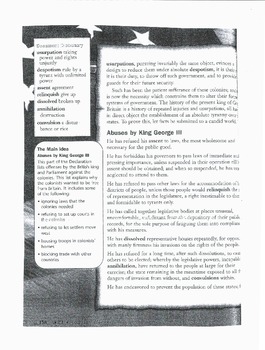

The Continental Congress - the first governing body (1774-89) of the *thirteen colonies which later became the US. Those signing it included Benjamin *Franklin, John *Adams and John *Hancock. One of its most famous sentences is this: 'We hold these truths to be self-evident: that all men are created equal that they are endowed by their creator with certain inalienable rights that among these are life, liberty, and the pursuit of happiness.' The document was mostly written by Thomas *Jefferson and received the approval of the *Continental Congress on 4 July 1776. The Declaration of Independence - the document in which the *thirteen colonies declared that they were independent of Britain and stated the principles of the new government. Minutemen from *Massachusetts fought at the battles of *Lexington and Concord at the start of the war, and similar groups were also formed in *Connecticut, *New Hampshire and *Maryland. They said they were ready to fight with only a minute's warning. Minuteman - a member of a group of American citizens during the *American Revolution who fought when they were needed. In order to protest about the British tax on tea, a group of Americans dressed as Indians went onto three British ships in *Boston harbour and threw 342 large boxes of tea into the sea. It occurred on 16 December 1773, two years before the *American Revolution. The Boston Tea Party - an incident in American history. It was called a massacre (= the killing of many people) to increase hatred for the British, and was one of the events that led to the *American Revolution. They were strongest in Boston and New York, where a group of them attacked British soldiers in 1770, one of the first serious actions that led to the *American Revolution.īoston Massacre - an incident on 5 March 1770 when British soldiers shot at American colonists and killed five of them. The Sons of Liberty - a number of secret organizations formed in the American colonies in 1765 to protest against the *Stamp Act. The Stamp Act was removed in 1766 but the tax, and the people's protests against it, are among the important events that led to the *American Revolution. They refused to use the stamps and prevented British ships from entering or leaving their ports. Many people in America thought that this was an unfair tax. It stated that all publications and legal documents in British colonies (= parts of the empire) in America must have official stamps, sold by the British government. The Stamp Act - a British *Act of Parliament in 1765. Those signing it included Benjamin Franklin, John Adams and John Hancock. One of its most famous sentences is this: 'We hold these truths to be self-evident: that all men are created equal that they are endowed by their creator with certain inalienable rights that among these are life, liberty, and the pursuit of happiness.' The document was mostly written by Thomas Jefferson and received the approval of the Continental Congress on 4 July 1776. The document in which the thirteen colonies declared that they were independent of Britain and stated the principles of the new government.


 0 kommentar(er)
0 kommentar(er)
